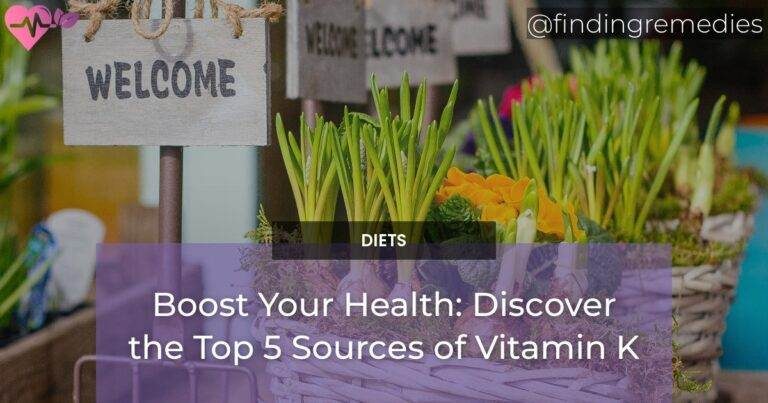Top 5 Sources of Vitamin K for Vegetarians and Vegans
Vitamin K is an essential nutrient that plays a crucial role in blood clotting, bone health, and overall wellbeing. It is found in both vegetarian and vegan sources, making it easy for those on plant-based diets to meet their recommended daily intake. In this article, we will discuss the top 5 sources of Vitamin K for vegetarians and vegans, the recommended daily intake, health benefits, and supplementation.
Importance of Vitamin K in Diet
Vitamin K is important for the body’s blood clotting process, making it essential for wound healing and preventing excessive bleeding. It also helps in the absorption of calcium, which is necessary for good bone health. Individuals with Vitamin K deficiency may experience easy bruising, excessive bleeding, and weakened bones.
Recommended Daily Intake of Vitamin K
The recommended daily intake of Vitamin K for adults is 90-120 mcg. Pregnant women are advised to consume 90-100 mcg, and breastfeeding women should aim for 120 mcg per day. Children’s recommended intake varies by age and gender.
Health Benefits of Vitamin K
Vitamin K has numerous health benefits, including:
- Preventing excessive bleeding
- Promoting healthy bone density
- Reducing the risk of fractures
- Protecting against heart disease and stroke
- Improving brain function
- Supporting healthy skin
Vegetarian Sources of Vitamin K
What are the best vegetarian sources of Vitamin K?
Vegetarian sources of Vitamin K include:
- Leafy greens such as kale, spinach, collard greens, mustard greens, and Swiss chard
- Tofu
- Green tea
- Broccoli
- Brussels sprouts
- Asparagus
- Kiwi
- Prunes
How much Vitamin K do vegetarian sources provide?
The amount of Vitamin K in vegetarian sources can vary. For instance, one cup of chopped kale provides over 1000% of the daily recommended intake. On the other hand, one cup of chopped raw spinach provides about 170% of the daily recommended intake.
ALSO READ
What are some delicious ways to add more Vitamin K-rich foods to a vegetarian diet?
There are many ways to add Vitamin K-rich foods to a vegetarian diet, such as:
- Adding spinach to a smoothie
- Sautéing collard greens with garlic and olive oil
- Making a broccoli salad with dried cranberries and nuts
- Roasting Brussels sprouts with balsamic vinegar and honey
- Adding asparagus to a stir-fry
- Making a kiwi and banana smoothie
- Snacking on prunes and almonds
Vegan Sources of Vitamin K
What are the best vegan sources of Vitamin K?
Vegan sources of Vitamin K include:
- Leafy greens such as kale, spinach, collard greens, mustard greens, and Swiss chard
- Tofu
- Green tea
- Broccoli
- Brussels sprouts
- Asparagus
- Kiwi
- Prunes
ALSO READ
How much Vitamin K do vegan sources provide?
The amount of Vitamin K in vegan sources can vary. For instance, one cup of chopped kale provides over 1000% of the daily recommended intake. On the other hand, one cup of chopped raw spinach provides about 170% of the daily recommended intake.
What are some delicious ways to add more Vitamin K-rich foods to a vegan diet?
There are many ways to add Vitamin K-rich foods to a vegan diet, such as:
- Adding spinach to a smoothie
- Sautéing collard greens with garlic and olive oil
- Making a broccoli salad with dried cranberries and nuts
- Roasting Brussels sprouts with balsamic vinegar and honey
- Adding asparagus to a stir-fry
- Making a kiwi and banana smoothie
- Snacking on prunes and almonds
Vitamin K-rich Foods
What are some Vitamin K-rich foods that are commonly found in grocery stores?
Some Vitamin K-rich foods that are commonly found in grocery stores include:
- Leafy greens such as kale, spinach, collard greens, mustard greens, and Swiss chard
- Tofu
- Green tea
- Broccoli
- Brussels sprouts
- Asparagus
- Kiwi
- Prunes
Why are leafy greens such a great source of Vitamin K?
Leafy greens are a great source of Vitamin K because they are rich in chlorophyll, which is a precursor to Vitamin K. They also contain other nutrients that are important for overall health, such as fiber, folate, and iron.
How do fermented foods provide Vitamin K?
Fermented foods such as sauerkraut, miso, and tempeh are sources of Vitamin K2, which is produced by bacteria during the fermentation process. Vitamin K2 is known to support gut health and bone health.
Supplementation of Vitamin K
Who might benefit from Vitamin K supplementation?
Vitamin K supplementation may be beneficial for individuals who are at risk of deficiency, such as those with malabsorption issues, liver disease, or who are taking certain medications that interfere with Vitamin K absorption. It is important to consult with a healthcare provider before taking any supplements.
What are the different types of Vitamin K supplements?
There are two types of Vitamin K supplements: Vitamin K1 (phylloquinone) and Vitamin K2 (menaquinone). Vitamin K1 is found in leafy greens, while Vitamin K2 is synthesized by bacteria in the gut and found in fermented foods.
How much Vitamin K should you take as a supplement?
The dosage of Vitamin K supplements varies based on individual needs and health status. It is important to consult with a healthcare provider before taking Vitamin K supplements.
Frequently Asked Questions
What is the recommended daily intake of Vitamin K?
The recommended daily intake of Vitamin K for adults is 90-120 mcg.
How can I get enough Vitamin K as a vegetarian or vegan?
Vegetarian and vegan sources of Vitamin K, such as leafy greens, tofu, and fermented foods, can provide ample amounts of Vitamin K to meet the recommended daily intake. Consuming a varied and balanced plant-based diet can help ensure adequate Vitamin K intake.

